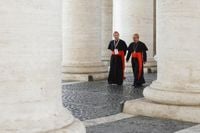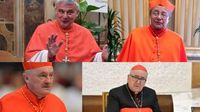On May 7, 2025, the Vatican witnessed a historic moment as the conclave commenced, with 133 cardinals, including four Polish representatives, gathering to elect the 267th Pope. The doors of the Sistine Chapel closed at 4:30 PM, marking the beginning of a significant event in the Catholic Church's history.
The Polish cardinals participating in this conclave are Stanisław Ryłko, Kazimierz Nycz, Grzegorz Ryś, and Konrad Krajewski. Notably, the fifth Polish cardinal, Stanisław Dziwisz, aged 86, is ineligible to vote. This conclave is particularly noteworthy as it is the third in over two decades, following the previous ones in 2005, after the death of Pope John Paul II, and in 2013, after Pope Benedict XVI's resignation.
As the cardinals proceeded from the Apostolic Palace to the Sistine Chapel, they followed a solemn procession, swearing an oath to maintain the secrecy of the papal election, as outlined in the apostolic constitution of Pope John Paul II, "Universi Dominici Gregis." The atmosphere was charged with anticipation, as the first smoke signal, indicating the outcome of the initial vote, was expected around 7:00 PM.
Among the Polish cardinals, Konrad Krajewski, born in 1963 in Łódź, stands out as a prominent figure. Serving as the Papal Almoner since 2013 and appointed cardinal by Pope Francis in 2018, he is often mentioned in media speculation as a potential successor to Francis. His commitment to helping the needy has earned him the nickname "the Vatican's Robin Hood." He has been known to personally deliver aid to war-torn Ukraine and has a reputation for his close collaboration with Pope Francis.
Grzegorz Ryś, the Metropolitan Archbishop of Łódź since 2017, was appointed cardinal by Pope Francis in 2023. He is recognized for his engagement in ecumenical and interfaith dialogue and is a member of the Dicastery for Divine Worship and the Discipline of the Sacraments. Although he is seen as a proponent of Francis's vision for the Church, he is not considered a leading candidate for the papacy due to his limited experience in the Roman Curia.
Kazimierz Nycz, born in 1950 in Stara Wieś, has been the Metropolitan Archbishop of Warsaw since 2007 and was appointed cardinal by Pope Benedict XVI in 2010. Known for his organizational skills, he has played a significant role in various initiatives within the Church. However, his age and relatively low media profile have led to him being less frequently mentioned among the papal candidates.
Stanisław Ryłko, born on July 4, 1945, in Andrychów, has extensive experience within the Roman Curia and was ordained a bishop by Pope John Paul II. He served as the President of the Pontifical Council for the Laity from 2003 to 2016 and is currently the Archpriest of the Basilica of St. Mary Major in Rome. Despite his significant contributions to the Church, his age makes him an unlikely candidate for the papacy.
The conclave's process involves a series of votes, with a candidate needing at least two-thirds of the votes—89 out of 133—to be elected. If a Pope is chosen, white smoke will emerge from the chimney of the Sistine Chapel, signaling the news to the world. If not, black smoke will indicate that further votes are necessary, with additional voting sessions scheduled for the following days.
As the cardinals entered the Sistine Chapel, they took their oath, pledging to uphold the secrecy of the election. The ceremony was steeped in tradition, with the cardinals dressed in their ceremonial robes and the hymn "Veni Creator" sung to invoke the Holy Spirit's guidance. Following the swearing-in, the cardinals were sealed within the chapel, cut off from the outside world as they embarked on the critical task of selecting the next leader of the Catholic Church.
The atmosphere was thick with anticipation as the first vote approached. Observers noted that there was no clear frontrunner among the candidates, with various factions within the College of Cardinals potentially influencing the election outcome. The dynamics of the conclave are complex, with competing interests and varying degrees of support for the Polish candidates.
John L. Allen Jr., an American Vatican expert, highlighted Krajewski's unique position, stating that he embodies the spirit of Pope Francis while also representing Polish roots, making him appealing to both progressive and conservative cardinals. However, other analysts suggest that none of the Polish cardinals are currently viewed as leading candidates.
As the day unfolded, the excitement surrounding the conclave grew. The first smoke signal was expected around 7:00 PM, with many speculating whether it would be white or black. The outcome of this conclave could shape the future direction of the Catholic Church, impacting millions of followers worldwide.
This conclave represents a pivotal moment in the Church's history, with the potential for a new papal leader to emerge from the ranks of the cardinal electors. With 80% of the electors being appointed by Pope Francis, the influence of his papacy looms large over the proceedings.
As the cardinals engage in this sacred process, the world watches closely, awaiting the announcement that will reverberate far beyond the walls of the Vatican. The anticipation builds as the faithful and observers alike hope for a leader who will guide the Church in these challenging times.

![Konklawe 2025 już dziś. Będą 4 polscy kardynałowie [PROCEDURA krok po kroku]](https://thumbor.evrimagaci.org/DZaFpkOTiG7QG82Dyd3HeP8hJNE=/200x0/tpg%2Fsources%2F8fc38a24-a8fc-41f7-b2da-942ebcd8600d.jpeg)

